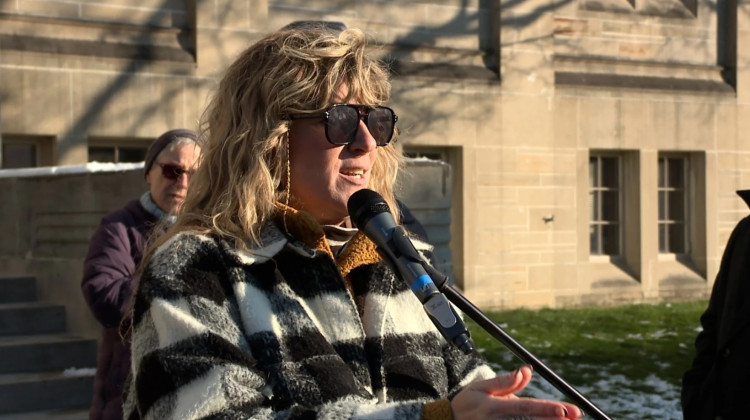
Key Learning Community, a K-12 school, is at 777 S. White River Parkway West Drive in Downtown Indianapolis
Key Learning Community’s historic run as the world’s first school built on curriculum inspired by the theory of Multiple Intelligences will come to an end next spring.
A tearful board member Mary Ann Sullivan, who was a Key parent, volunteer and supporter over 15 years, prefaced a 6-1 vote to close down the program by saying its demise is an example of how central office meddling can ruin an innovative school.
“I cannot help but wonder what Key would look like now,” she said. “What if the district would have supported, rather than undermined, their work?”
Read More: IPS Board Approves Plan To ‘Reinvent’ How Schools Operate
Following that rationale, the board went on to approve a plan that would move IPS schools toward more autonomy for principals, giving them added freedom to make decisions about how schools are managed independent of the central office.
Key’s closing is part of a broader plan that would move the elementary arts magnet program from School 70, on the city’s north side, to just west of downtown in the Key building. The arts magnet would expand to grades K-8 while Broad Ripple High School would drop middle school grades from its arts magnet program. School 70 then would become the fourth Center for Inquiry magnet school.
But the second half of the plan is on hold until meetings are held this week at School 70, Broad Ripple and Key. The board will vote on changes at School 70 and Broad Ripple on Nov. 9.
Sullivan said the decision to close Key demonstrated the need for a plan to move IPS schools toward more freedom for principals to make decisions about budget, staffing curriculum and school start and end times.
“I’ve had a front row seat to the slow dismantling of the dreams of the incredible women who started the Key school,” Sullivan said. “I know who the bad guys were and who the good guys were in this long, sad story. The IPS administration was always messing with something that mattered in order for the school to succeed.”
Key has been in danger or closing down for several years, and closing it was first recommended last year.
The school was widely studied by education researchers for it first-of-a-kind curriculum. The inspiration was Howard Gardner, a renowned Harvard University psychologist, who devised a theory that attempted to categorize human behaviors that he felt qualified as “intelligence.”
He originally identified seven: visual-spatial, bodily-kinesthetic, musical-rhythmic, interpersonal, intrapersonal, linguistic and logical-mathematical. Every person, he theorized, possessed a unique mix of strengths and weaknesses in each category.
A group of IPS teachers read Gardner’s book traveled two states to hear him speak and devised the blueprint for the Key school, which opened in 1987 to international attention. The school was an initial success with strong test scores and high demand. But performance waned over time until the school earned F-grades from the state for several years in a row.
In an effort to avoid state takeover, IPS hired Sheila Dollaske as principal in 2012, asking her to alter the program to keep its principles while shifting to a stronger academic focus. The elementary students in the K-12 school made a 20 percentage point jump in their ISTEP passing rate and posted an A-grade in Dollaske’s first year. But scores then fell back, and Dollaske left earlier this year to accept a fellowship from The Mind Trust to develop a middle school program for IPS.
Information meetings this week will be held at Key (6 p.m. Monday), School 70 (6 p.m. Tuesday) and Broad Ripple (6 p.m. Wednesday).
Chalkbeat Indiana is a nonprofit news site covering educational change in public schools.
 DONATE
DONATE







 Support WFYI. We can't do it without you.
Support WFYI. We can't do it without you.